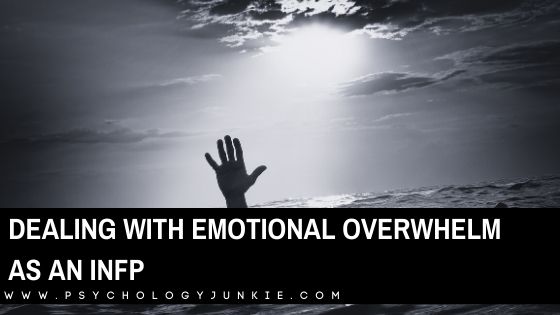Here’s What Comforts You, Based On Your Personality Type
Look, feeling sad or overwhelmed is awful. There’s no way around it. Whether it’s a rough day, a major life crisis, or just that weird, unshakable gloom that sneaks up for no reason at all (fun!), we all have moments where we just feel… off. And while there’s no one-size-fits-all solution for dealing with sadness, there are patterns—ways each personality type instinctively seeks comfort when life decides to throw a curveball straight at their face.
Maybe you’re an ENFP who needs to escape to a beautiful new place before talking it out, or an ISTP who needs to disappear into solitude and do something with their hands. Maybe you’re an INFJ who gets lost in introspection and a warm blanket, or an ESTP who processes emotions best at 80 miles per hour with the windows down and music blasting.

Wherever you land on the personality spectrum, this guide is here to help you recognize your own emotional survival tactics, validate your quirks, and maybe even give you some new ideas when your usual coping mechanisms (i.e., staring at the ceiling and questioning existence) aren’t cutting it.
Let’s get into it.Not sure what your personality type is? Take our personality questionnaire here. Or you can take the official MBTI® here.
Table of contents
Estimated reading time: 18 minutes
The ENFP
You’re down. The world feels like a soggy burrito of disappointment. What do you do? First, get out. Trapped spaces are your personal hell, and nothing fuels your existential dread faster than staring at the same four walls while your mind plays an angsty indie film montage of your failures.
So go somewhere beautiful—somewhere new. A forest, a rooftop, even just a drive through winding roads with your favorite playlist on repeat. You need fresh input to remind your brain that the world is bigger than whatever’s making you feel stuck.
Once you’ve had time to marinate in your feelings (and let’s be real, probably cry to that one song), find your person. Not just anyone. The friend who actually listens—who doesn’t steamroll you with advice or demand that you “cheer up” immediately. You don’t want a pep talk; you want someone who will sit in the darkness with you and say, “Yeah, this sucks. I get it.” Solutions can come later—after you’ve processed and recharged.
Also, drink some water. You forget, and dehydration makes everything worse.
Read This Next: 3 Weird and Wonderful Secrets About the ENFP
The ENTP
You’re sad. This is inconvenient. You have things to do. But before you try to debate your own emotions into submission, let’s do a quick basic needs check: Have you eaten? Slept? Consumed any liquid that isn’t coffee? If the answer is no, congratulations, you’ve entered the “malnourished raccoon” phase of stress. Fix that first.
Once you’re slightly less feral, change your environment. You get restless when you’re emotionally stuck, so go somewhere new—a museum, a bookstore, a random part of town you’ve never explored. If you can’t physically escape, find a mental escape hatch: deep-dive into an interesting topic, a weird documentary, or a ridiculous internet rabbit hole.
When you’re ready, talk it out—but only with someone who gets you. You need a friend who can listen without trying to fix you or, worse, mirroring back your own chaotic energy. The last thing you need is someone panicking because you made a dark joke about life’s meaninglessness. Find the person who can handle your spirals without flinching. Vent. Process. Then, make a plan. Even a half-baked one. Knowing you have options makes everything feel lighter.
Read This Next: 10 Surprising Truths About ENTPs
The INFP
Oh no. Feelings.
Look, you’re not running from them. You know they have to be felt. But that doesn’t mean you’re ready to sit in the middle of the storm without a life raft. So here’s your survival kit:
- Music – The right song doesn’t just reflect your mood; it holds your hand through it. You probably already have a “Melancholy but Cinematic” playlist for this exact reason. Use it.
- Comfort items – Soft blanket. Warm drink. A book that’s basically an emotional support animal in paper form. These things matter.
- Journaling – Your brain is a swirling mess of half-formed thoughts and poetic despair. Writing them down can help you sort through the chaos. Don’t worry about making sense—just let it out.
And when you’re ready, find your safe person. Not the “here’s a five-step plan to fix your mood” person. You need someone who will just be there, nodding along, maybe offering you a snack, maybe saying, “That sucks, I’m sorry.” Because validation? That’s the real comfort.
Read This Next: 24 Signs That You’re an INFP, the Dreamer
The INTP
Bad mood? Retreat. Barricade yourself in your mental fortress and consume something familiar—a book, a movie, a piece of media that feels like home. Nostalgia is grounding when life feels unstable.
But here’s the thing: Don’t stay isolated too long. You love your alone time, but unchecked sadness can trap you in a weird introverted-thinking doom loop where you overanalyze your feelings and past mistakes into oblivion. At some point, you need external input—even if it’s just a quiet walk outside or a conversation with someone who won’t try to psychoanalyze you (unless you’re into that, in which case, proceed).
And when you do talk to someone, make sure it’s a non-intrusive listener—someone who won’t bombard you with emotional intensity or expect a heart-to-heart of epic proportions. You need space to think out loud, no pressure, no forced vulnerability.
Also, eat something. You forgot, didn’t you?
Find out More About INTPs: 3 Weird and Wonderful Secrets About the INTP
The ENFJ
When you’re feeling gloomy or overwhelmed it can be very comforting to be in the presence of the people you trust. You want to be able to fully express what’s going on in your heart and find validation and affirmation from loved ones.
Yes, you love helping others more than being helped, and yes, you worry about being a burden. But make space for yourself anyway. Find your people—the ones who will let you unload without judgment and remind you that you don’t have to have it all together 24/7.
Step two: Change your surroundings. Your environment affects you more than you realize. A dim, cluttered room? Instant mood drop. A bright, open space? Instant relief. Whether it’s a scenic walk, a cozy café, or a simple decluttering session, getting your external world in order helps reset your internal world.
Step three: Music. Not just any music. The kind that acknowledges your feelings but also nudges you toward hope. You don’t need a full-blown serotonin rave, but something with a steady beat and a message of resilience? That’s the sweet spot.
And if none of that works? Give yourself permission to do nothing. Sometimes, just sitting with your feelings—without trying to fix them immediately—is the most healing thing you can do.
Find out More: 24 Signs That You’re an ENFJ, the Mentor
The ENTJ
You’re frustrated. Maybe even angry. And if you’re really upset, it’s probably because you feel stuck—like you’re wasting time, like something isn’t working the way it should.
Your first instinct? Move. Physically, mentally, whatever. Stagnation is your kryptonite, and the quickest way out of a bad mood is to do something. Even if it’s just taking a walk, working out, or rage-cleaning your entire house—motion makes everything feel more manageable.
Once you’ve burned off some frustration, you need a person—but not just anyone. You need someone who listens, lets you vent without coddling, and doesn’t hit you with patronizing sympathy. If they say “just let it out” in a baby voice, run.
After that, give yourself a task—something productive, something that reminds you you’re in control. Organize. Strategize. Make a plan. Hell, make three. The simple act of knowing your next steps is enough to take the weight off your chest.
And if nothing else? Blare an intense playlist and go for a drive like you’re the protagonist in a dramatic movie. Works every time.
Find Out More: 10 Things You’ll Relate to If You’re an ENTJ
The INFJ
Ah, existential dread. Your old friend.
When you’re feeling down, you don’t just feel sad—you feel unmoored, untethered, as if life itself is suddenly an abstract concept with no real meaning. (Fun times!)
Step one: Retreat. Not forever, just long enough to reset. Your world feels overwhelming, so shrink it. Dim the lights, wrap up in a blanket, find comfort in familiar things. A book that speaks to your soul, a song that’s been with you for years—something that reminds you that, at your core, you’re still you.
Step two: Check your basic needs. You’re an intuitive-dominant type, which means you forget about your body until it starts actively rebelling against you. Have you eaten? Are you dehydrated? When was the last time you got actual, real rest? Fix that.
Step three: Let it out. Talk to someone you trust—someone who won’t analyze you to death or offer you “practical solutions” (ugh). If talking feels like too much, journal. Or write a long, dramatic letter to no one and then immediately delete it. (You know you’ve done it before.)
And if all else fails? Go outside. Nature won’t fix your existential crisis, but trees are comforting, and that counts for something.
Read This Next: 24 Signs That You’re an INFJ, the Mystic
The INTJ
You’re upset, and logically, you know emotions are just data, but that doesn’t make them any less inconvenient.
Step one: Eliminate unnecessary stressors. That means silence. No background noise, no small talk, no “Are you okay?” texts to ignore. Dim the lights, close the door, and just exist.
Step two: Do a systems check. Are you overwhelmed because you’re genuinely overworked, or are you mentally spiraling? If it’s the first, cut unnecessary obligations. If it’s the second, disrupt the spiral. Go outside, listen to an audiobook, consume something thought-provoking that pulls you out of your head.
Step three: Process the mess. You don’t need to talk to anyone unless you want to—but you do need an outlet. Journaling can help untangle the mental spaghetti, turning the chaos into something structured. If that feels like too much effort, put on music that matches your mood—not to wallow, but to sync up with it, ride it out, and let it pass. Bonus points if you listen to something with a dramatic orchestral buildup that makes you feel like an unstoppable mastermind plotting your next move.
Step four: Regain control. You feel better when you have a plan. It doesn’t have to be groundbreaking—just something that reminds you that you’re capable of fixing things and moving forward. Even something as small as tidying your space, reorganizing your calendar, or outlining your next steps can help reset your brain.
And if none of that works? Rewatch a favorite show where the main character is even more emotionally unavailable than you. At least you’ll get a laugh.
Read This Next: 3 Weird and Wonderful Secrets About the INTJ
The ESFP
You’re feeling down, and for you, that’s like someone dimming all the lights in a room where the music was playing. Everything just feels off.
Step one: Find your person. The one who actually listens—not the one who interrupts with “cheer up” speeches or tries to problem-solve your emotions like they’re a broken toaster. You don’t need someone to fix you. You need someone who can sit with you, maybe offer you a snack, and just be there.
Step two: Move. Your body holds onto stress like an overstuffed suitcase, and the best way to shake it off is to, well, shake it off. Go for a run, dance in your living room, punch a pillow, take a ridiculously long walk with no destination in mind. Get out of your head and into motion.
Step three: Change the scenery. The same four walls will suffocate your mood. Go somewhere different—a park, a café, even a random part of town you’ve never explored. New sights, new sounds, new energy—it helps more than you realize.
Step four: Plan something fun. Even if it’s small, having something to look forward to shifts everything. It could be a weekend trip, a spontaneous adventure, or just a night in with your favorite movie and some really good food. The key? Remind yourself that joy isn’t gone forever—it’s just waiting for you to find it again.
Read This Next: What It Means to be an ESFP Personality Type
The ESTP
You’re in a funk. This is annoying because, frankly, you have better things to do than feel bad.
Step one: Get away. Physical movement = mental clarity for you. Go for a drive, take a walk, hit the gym, do something active. You need adrenaline, fresh air, or both. Sitting still and stewing? Not an option.
Step two: Make a plan. You hate feeling trapped, and nothing makes you feel more trapped than not having options in mind. Even if you can’t fix everything right now, make a contingency plan. Give yourself options. Knowing you could take action, even if you don’t have to, is enough to keep you from spiraling.
Step three: Be selective with people. Sometimes you want to vent; sometimes you just want someone to shut up and do something fun with you. Choose wisely. The person who just wants to pry into your emotions like a surgeon with a scalpel will probably only stress you out more (not that there isn’t a time for that, but not when you’re already at rock bottom).
Read This Next: 24 Signs That You’re an ESTP, the Daredevil
The ISFP
Sadness hits you deep. You don’t just feel bad—you absorb it. The weight of it, the texture, the way it changes the way colors look and music sounds. You live through emotions like they’re stories unfolding in real time.
So what do you do? You let yourself feel it. No forcing positivity, no fake smiles. If your emotions were a song, you’d listen all the way through—every note, every lyric.
Your safe space matters. Find beauty in something small. A song that resonates. A painting that makes you feel seen. A walk in nature where the world is still breathtaking, even when you’re struggling.
And when you’re ready? Create. Write, sketch, play music—anything that pulls the feelings from inside you and turns them into something tangible. You don’t have to share it. You don’t even have to finish it. But expressing it in a way that feels real? That helps.
Talking might help, too, but only with the right person. Someone who doesn’t rush you to “move on” or “look on the bright side.” Just someone who listens, understands, and sits in the quiet with you.
Remember: This will pass. And when it does, you’ll emerge with a deeper appreciation for beauty, for meaning, and for the resilience you’ve always had.
Read This Next: 10 Things You’ll Relate to If You’re an ISFP
The ISTP
When life gets overwhelming, your first instinct is to disappear. Not in a dramatic, storm-out-the-room way—more like a quiet retreat into “don’t talk to me” mode.
Which, honestly? Fair.
You process thoughts internally, not through long-winded conversations or public displays of frustration. So go ahead—step back, find some space, and shut the world out for a bit.
Then, do something physical. Exercise, fix something, take apart a gadget just to put it back together. You process emotions through action, not words. If your brain feels like a tangled mess, working with your hands helps untangle it.
When you’re ready, do a systems check. Are you actually upset, or are you just overstimulated, hungry, sleep-deprived, or bored out of your mind? Fixing the simple stuff first clears out the mental clutter.
If the feeling lingers, try writing it down. You don’t have to write a novel—just a few sentences about what’s bothering you. Seeing it in black and white might give you some clarity. Or try talking to someone who can be patient and calm without taking every little thing you say personally and overanalyzing it to oblivion.
And if all else fails? Go for a drive with your favorite playlist blasting. Windows down, music up, nowhere in particular to be. Sometimes, that’s all you need.
Find Out More About ISTPs: Understanding ISTP Thinking
The ESFJ
You, my friend, are a giver. You take care of people, make sure things run smoothly, and probably answer texts faster than 98% of the population. But when you’re feeling down? That whole “caretaker of the universe” role suddenly feels very heavy.
So let’s start with this: It’s okay to focus on yourself for a minute. You spend so much energy making sure everyone else is okay that sometimes you forget you’re a person too. A person who has needs. And emotions. And possibly an empty fridge because you were too busy making dinner for other people.
Step one: Get a change of scenery. Sitting in the same place where you’ve been stressed just marinates you in bad vibes. Go somewhere different—a coffee shop, a park, even just a drive with your favorite playlist. New environment, new perspective.
Step two: Talk it out—but only with the right person. You don’t need someone who will dismiss your feelings with a casual “cheer up!” You need someone who actually listens. Who lets you vent without immediately launching into “fix-it” mode. (If they also happen to bring snacks? Even better.)
Step three: Do something that absorbs your attention. Cooking, gardening, rearranging furniture—whatever keeps your hands busy and your brain not overthinking everything. Bonus points if it’s something that brings you even the smallest spark of joy.
And above all, remember: You are not responsible for everyone else’s happiness. It’s okay to take a step back. It’s okay to just exist.
Read This Next: 24 Signs That You’re an ESFJ
The ESTJ
You don’t do feelings. Not in the “let’s sit and analyze our emotions for six hours” kind of way. But here’s the thing—you’re not a robot (even if people assume you have spreadsheets where your emotions should be). And when life gets overwhelming, you feel it, even if you’d rather just power through.
The trick? Reset, don’t suppress.
Start with the basics. Have you eaten actual food today, or just fueled yourself on caffeine and spite? Have you slept more than four hours? Have you had a moment to just breathe? Fix the foundational stuff first.
Then, get moving. Exercise, deep-clean your house, go outside—do something that reminds you you’re in control. If you sit still for too long, you’ll start brooding, and we both know that only tends to make you feel worse.
Once the storm has passed a little, talk to someone—but the right person. You don’t need a three-hour heart-to-heart, just a straightforward chat with someone who gets you. Someone who won’t poke and prod at your emotions and take everything you say personally, but will listen, nod, and maybe say something refreshingly practical.
And finally, find a problem to solve. You feel better when you have a plan. It doesn’t have to be about the thing that upset you—it could be anything. Organizing a schedule, tackling a project, figuring out your next steps. Just remind yourself that you’re the kind of person who gets things done.
Read This Next: 24 Signs That You’re an ESTJ
The ISFJ
You don’t like feeling like a burden. So when you’re sad, you tend to keep it to yourself. You withdraw, you distract yourself with responsibilities, you tell yourself, It’s fine. I’ll deal with it later.
But let’s be honest—later never comes, does it?
So let’s try something different. Step one: Give yourself actual permission to rest. You’re always doing things for other people, always making sure everything is taken care of. But when was the last time you truly, guilt-free, took care of yourself?
Make a cup of tea. Wrap up in your softest blanket. Watch a comfort movie—the kind you’ve seen a million times but still makes you feel safe. Take a deep breath and remind yourself: It’s okay to not be okay.
When you’re ready, write it down. Journaling can help sort out the tangled mess of emotions in your head. You don’t have to make sense of everything right away, but getting your thoughts out (even just onto paper) can help lighten the load.
And if you’re feeling isolated? Reach out. Not to just anyone—the person. The one who makes you feel seen, who listens without interrupting, who won’t tell you to “just get over it.” Talking things out doesn’t mean you’re weak—it means you’re human.
One last thing: You matter just as much as the people you take care of. Don’t forget that.
Related: 10 Things You Should Never Say to an ISFJ
The ISTJ
You like structure. You like things to make sense. But emotions? Emotions do not follow a checklist. And that is deeply annoying.
When you’re feeling off, the first instinct is to power through. (Which, let’s be honest, sometimes works.) But ignoring your feelings forever is like ignoring a leaky pipe—it doesn’t go away; it just gets worse.
So let’s troubleshoot. First, isolate the problem. Are you overwhelmed? Frustrated? Annoyed at someone’s blatant disregard for logic? Pinpointing the issue makes it easier to handle.
Then, do something small but productive. Organize your space. Make a to-do list. Fix something that’s been broken for weeks. You’re wired to solve problems, so even if you can’t fix this problem immediately, reminding yourself you’re capable of taking action helps.
That said—don’t just bury yourself in work forever. Once the initial storm settles, try writing it down. Not because you need to become a poet about your feelings, but because seeing your thoughts on paper can help you process them.
And if you really need to vent? Find someone who listens without overanalyzing you. You don’t need a therapy session. You just need someone who respects your space, nods in understanding, and doesn’t hit you with “Everything happens for a reason.” (Ugh.)
Remember: Emotions aren’t problems to solve. Sometimes, they just need to be acknowledged. And then? You move forward—because that’s what you do best.
Related: 10 Things You Should Never Say to an ISTJ
What Are Your Thoughts?
Do these ideas comfort you? Do you have any other ideas? Share your thoughts with readers in the comments!
Find out more about your personality type in our eBooks, Discovering You: Unlocking the Power of Personality Type, The INFJ – Understanding the Mystic, The INFP – Understanding the Dreamer, and The INTJ – Understanding the Strategist. You can also connect with me via Facebook, Instagram, or Twitter!










Good article but it’s bugging me and I have to let you know it isn’t “chance of scenery”, it’s “change of scenery.” Sorry to be pedantic but it was a little distracting considering it’s listed as what just about every type finds comforting… :/
Holy cow, I don’t know how that happened. I meant to write change of scenery – I wonder if my new version of word autocorrected it to chance? That’s so weird! Thank you for letting me know so that I could fix it!
A lot of the different types seem to have the exact same need. All of the sections end with being able to vent to a trusted confidant in one way or another. I do see some variance but it all boils down to be around people or not and then vent to someone.
I read every section a s they all seem to be saying the same thing unfortunately. For everytime it is basically being around people or being more isolated for a time. Then revisiting your favorite books, music or movies. And lastly find a trusted friend to vent to. I’m a little let down that there wasn’t a more unique way of comfort for any of the types.
Hi Susan, I’m a INFJ personality. I find myself not be able to find anyone to talk to who will really listen to me, and share intelligent conversation. I hate small talk, Sports with all of it’s hype. People just seem very shallow. Where are the people that have some wisdom and depth? Intelligence?
Have you tried joining an online support group or INFJ group? Perhaps you could find deeper conversation there! I rarely see anyone discussing sports in such groups 🙂 Sometimes there are meetups that center around specific topics as well.
I didn’t read them all ✋🏽 Maybe later, but I want to say that while I type myself as an ISTP, but didn’t relate to what was said about it, I did GREATLY relate to the INTP. (the type I get everytime I take the test.) not only does it comfort me when I am stressed to do something that reminds me of childhood, but finding a song from childhood that I’ve forgotten until then brings me SO much joy. And for the types having similar solutions to comfort, I think it makes sense. It can’t be too specific for someone with the type, because every person is WAY too unique to even be the same as their fellow same-types. And it’s not “Extroverted types feel better around people”, and “introverted types feel better alone”, or anything similar to that. I think the INTP thing is spot on for me, because it is something that has been true for me since I could remember and I can’t think of a cause for it being that way.
People have one thing in common: we all need someone to vent to, and we all need a break at some point. Anyone who doesn’t need either is going to be the first person like that. You might be able to bottle up the stress and feelings and thoughts but at some point it’ll be too much. Even writing in a journal can help, but everyone needs a friend to talk to. I feel very sad for those who cannot find anyone, because I know what it’s like to not have something to release pressure. I’m feeling it right now actually
Female INTJ here. #5 – break out the dark chocolate.
YES! I 100% agree with you
Hey, quick question: my brother typed as ISTP, (twice) but I really feel like he was mistyped. Example? “ When life gets overwhelming, your first instinct is to disappear. Not in a dramatic, storm-out-the-room way—more like a quiet retreat into “don’t talk to me” mode.” When something is wrong, he leaves in a “dramatic, storm-out-the-room way”. What type do you think he really is?